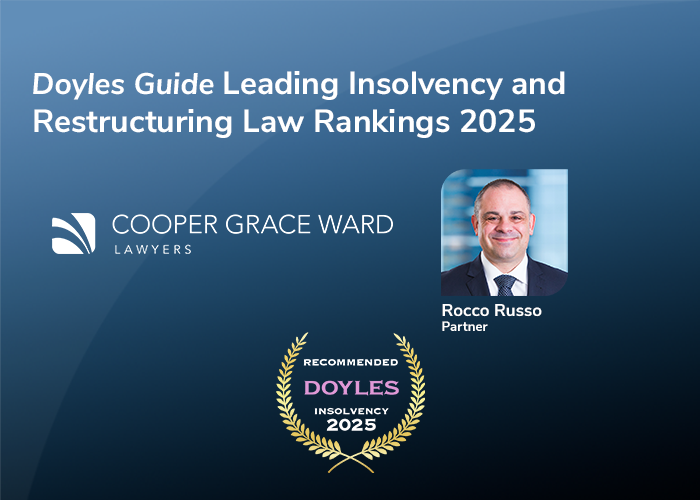A mortgagee can often find its equity position eroded by the mortgagor failing to pay body corporate levies on the mortgage property.
Until recently, there has been an unresolved issue as to whether a mortgagee in possession is liable to pay the recovery costs incurred by the body corporate in attempting to recover outstanding levies from the mortgagor.
The Court of Appeal of the Supreme Court of Queensland has recently held that a mortgagee in possession is liable to pay the reasonable recovery costs incurred by the body corporate. There are still however a number of unresolved issues.
In Westpac Banking Corporation v Body Corporate for the Wave Community Title Scheme 36237 [2014] QCA73, the body corporate had incurred costs of approximately $150,000 in attempting to recover outstanding levies from the mortgagor.
The mortgagor had defended the body corporate’s recovery proceedings, unsuccessfully appealed the judgement obtained against them and then went bankrupt on their own petition.
The mortgagee had also been prevented from taking enforcement action against the mortgagor due to a dispute before the Financial Ombudsman (FOS dispute).
Background to body corporate legislation
There are different regulation modules that may apply to a body corporate in Queensland (Regulations).
The Regulations are similar regarding the obligations for payment of a contribution, instalment, penalty and the recovery costs reasonably incurred by the body corporate. They provide as follows
- If a contribution or contribution instalment is not paid by the date for payment, the body corporate may recover as a debt:
(a) the amount of the contribution or instalment;
(b) any penalty for not paying the contribution or instalment; and
(c) any costs (recovery costs) reasonably incurred by the body corporate in recovering the amount. - If the amount of a contribution or contribution instalment has been outstanding for two years, the body corporate must, within two months from the end of the two year period, start proceedings to recover the amount.
- A liability to pay a body corporate debt in relation to a lot is enforceable jointly and severally against:
(a) a person who was the owner of the lot when the debt became payable; and
(b) a person (including a mortgagee in possession) who becomes an owner of the lot before the debt is paid. - The body corporate can fix a penalty up to 2.5% for each month a contribution or instalment is in arrears.
- A mortgagee in possession and the buyer from the mortgagee will be jointly and severally liable for the payment of the body corporate debt.
- If an owner is liable for a contribution or a contribution instalment, and a penalty, an amount paid by the owner must be applied:
(a) first, towards the penalty;
(b) second, in reduction of the outstanding contribution or instalment; and
(c) third, towards any recovery costs for the debt.
Body corporate debt
There have been some conflicting decisions regarding whether body corporate’s recovery costs are within the definition of ‘body corporate debt’ and whether a mortgagee in possession is liable for the payment of the recovery costs.
In Wave, the Court of Appeal held that:
- the reasonable recovery costs of the body corporate as defined in the Regulations comes within the definition of ‘body corporate debt’;
- a mortgagee in possession is liable for those recovery costs even if they were incurred by the body corporate before the mortgagee went into possession;
- it did not matter that the mortgagee had been prevented from taking enforcement action against the mortgagor due to the FOS dispute.
The issue of what constitutes ‘reasonable recovery costs’ was not considered by the Court of Appeal.
Reasonable recovery costs
There have been conflicting decisions as to what constitutes ‘reasonable recovery costs’ and, in particular, whether only those costs ordered by a court or a tribunal can be recovered.
In The Body Corporate 4399 Woolcock Street CTS 34700 v Sexton & Ors [2013] QCATA 55, the Member ruled that recovery costs are not limited to costs ordered by QCAT or a court. Although it has not been determined by a superior court in Queensland, we suggest that this ruling is correct.
It is clear the body corporate will have the onus of showing that the costs and disbursements it claims have been reasonably incurred and are reasonable in amount.
Relevant considerations could include:
- the type and amount of work done;
- the reasonableness of the amounts charged for the work;
- whether the work was relevant and necessary to be performed;
- any conduct of the body corporate, including any failure to make adequate or reasonable attempts to locate or make contact with the lot owner;
- whether the lot owner was provided reasonable opportunity to address the arrears before incurring significant debt recovery costs;
- the proportion of the recovery costs charged to the lot owner compared with the amount of the outstanding arrears; and
- whether the body corporate provided any notice and periodic updates to the mortgagee of the arrears and recovery costs being incurred.
Implications for mortgagees
If a mortgagee enters into possession, it will be liable for the payment of outstanding levies, any penalty and the reasonable recovery costs of the body corporate.
It may be prudent to ascertain the position in relation to the amount owed to the body corporate before going into possession.
A mortgagee should:
- not ignore a notice from the body corporate advising that there are outstanding levies;
- consider whether it is appropriate to issue a default notice to the mortgagor requiring the mortgagor to pay the outstanding amounts to the body corporate; and
- consider whether its position is best protected by paying the outstanding amounts to avoid the penalty being charged and the incurring of recovery costs by the body corporate.
A penalty may be accruing on the outstanding levies at the rate of 2.5% per month. The recovery costs being incurred by the body corporate may be significant and increasing.
There are a number of scenarios where the mortgagee could be in unchartered waters:
- Where the mortgagor is disputing the amount claimed by the body corporate, should the mortgagee act as a bystander while the mortgagor defends the body corporate’s court proceedings and the penalty and recovery costs increase? Or should the mortgagee step in and pay any part of the disputed amount and, if so, upon what terms?
- Upon settlement of a mortgagee sale, the buyer will require the outstanding levies, penalty and recovery costs to be paid by the mortgagee. If the mortgagee at settlement is disputing the amount being claimed by the body corporate, will the mortgagee have no practical alternative but to pay the disputed amount under protest and reserve its rights against the body corporate?
- If a body corporate has obtained a costs order against the mortgagor in proceedings that did not involve the mortgagee, is the mortgagee prevented from challenging the amount of the costs ordered by the court?
The question of what constitutes reasonable recovery costs is likely to continue to be a contentious issue for both body corporates and mortgagees and will need further guidance from the courts. Whether the recovery costs being claimed by the body corporate are reasonable will depend upon the circumstances of each case.
A final reminder
If the mortgagee enters into possession and later decides not to take further enforcement action under the mortgage, it is imperative that the mortgagee gives the statutory notice to the body corporate that the mortgagee has decided not to proceed with the enforcement of the mortgage. Upon the giving of the statutory notice the mortgagee ceases to be a mortgagee in possession.
If you would like more information about these issues, please contact Graham Roberts or Sarah Dewar on +61 7 3231 2404.



